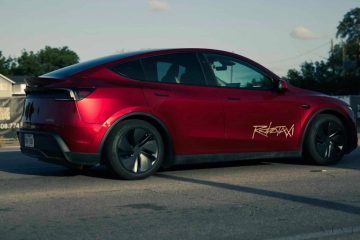Apple Will Absorb Tariffs on Its Chinese-Made Products, Analyst Says. Apple Stock Says Something Different

Apple’s tariff problems could cost the company dearly. But whether it will cost consumers dearly is suddenly up for debate.
In a note to investors late on Sunday, TF International Securities analyst Ming-Chi Kuo said that a proposed 10% U.S. tariff on Chinese goods, which could be levied starting on September 1, could have a direct impact on several Apple products, including the iPhone. He added, however, that the costs Apple would incur to sell products it manufactures in China might not be passed on to consumers.
“If the U.S. government starts to hit $ 300 billion worth of Chinese goods with a 10% tariff, we forecast that, in the mid-short term, Apple will absorb most of the additional costs due to tariffs, and the prices of hardware products and shipment forecasts for the U.S. market will remain unchanged,” Kuo wrote to investors.
His comments come as investors fear a never-ending trade war with China and further attempts by the Trump Administration to use tariffs as firepower. At least some of those tariffs will place an additional tax on the products American companies manufacture in China. Those companies, including Apple, might ultimately opt to pass those costs to U.S. consumers.
Earlier this year, Wedbush analyst Dan Ives told investors in a research note that tariffs affecting Apple’s iPhone could increase the company’s manufacturing costs by up to 3%. In the case of the $ 999 iPhone XS, Ives said at the time, Apple would need to increase its price to $ 1,029 to pass the cost on to consumers and preserve its margins.
For public companies needing to face investors each quarter, preserving margins is critical. And any erosion in those margins could be a signal to investors that things could get worse.
In an interview with Fortune on Monday, Ives said Apple absorbing tariff costs could trouble the company’s investors. Apple stock dropped more than 5% to 193.34 on Monday (and has continued to fall in after-hours trading). It’s the company’s largest hit since May 13, when Apple stock fell 5.81%, also due to the trade war between the U.S. and China.
Apple stock: A trade war prisoner?
Apple’s investors are clearly concerned about the the impact tariffs might have on the iPhone maker. Ives estimates that if Apple absorbs the tariffs, its profitability would drop by 4% in 2020. On a company that generated $ 60 billion in profit during its last fiscal year, that 4% drop could translate to several billion dollars of lost profits.
“We would be surprised to see Apple not at least pass some of these costs to consumers,” Ives said. If it doesn’t, Ives predicts Apple’s stock could drop by $ 20 to $ 25 per share.
But Kuo sees it differently.
He acknowledged to investors that tariffs could be a drag on Apple’s profits, but said that “the company will reap benefits in its brand image and relationships with suppliers” by absorbing costs instead of passing them on to consumers.
“We also believe that the negative impact on Apple are limited and temporary because the profit from service business is growing,” Kuo said, referring to Apple’s fast-growing division, which includes streaming-music service Apple Music and cloud-storage offering iCloud.
Last week, Apple reported a slight uptick in sales during its fiscal third quarter of $ 53.8 billion, despite iPhone revenue falling nearly $ 4 billion to $ 26 billion. Apple’s Services business grew its revenue more than $ 1 billion year over year to $ 11.5 billion.
Despite that increase—and higher sales for Apple’s Mac, iPad, and Wearables divisions—Apple’s $ 10 billion in profit was down from $ 11.5 billion in the prior year.
But Kuo is looking long-term. He didn’t say how much the “brand image” improvements could increase Apple’s bottom line over time, but he did say that Apple reducing its reliance on Chinese production won’t be far off.
In search of the next Shenzhen
Kuo noted that up to 5% of iPhone production is already underway in countries outside of China, including India, and based on reports and his supply chain checks, he believes that figure could grow to 25% of total iPhone production next year by Apple moving some of its iPhone manufacturing to Vietnam. Kuo estimates that 20% of iPad, Mac, and Apple Watch production will move outside of China next year (the exact location is undecided), and up to 30% of AirPods manufacturing will find its way to Vietnam in 2020.
“We believe that Apple’s non-Chinese production locations could meet most of the demand from the U.S. market after two years,” Kuo said.
Several recent reports have suggested Apple is working hard to identify manufacturing opportunities outside of China. India and Vietnam are obvious candidates because of their low costs and skilled labor, but Cook said last week on his company’s earnings call that Apple could produce its high-end Mac Pro desktop in the U.S.
The more production Apple can move out of China, the easier it will be for the company to sidestep tariffs. This is something Kuo believes will happen, and he even told investors on Sunday to “ignore” talk of the tariffs’ impact on Apple.
Alas, only Apple knows for sure what impact the tariffs might have on its business. And that’s probably why Tim Cook has been personally lobbying President Donald Trump to cool tensions with China.
But publicly, Cook has signaled little fear. “I know there’s been a lot of speculation around the topic of different moves and so forth,” Cook said about the tariffs on his earnings call last week. “I wouldn’t put a lot of stock into those, if I were you.”
The problem for Cook is, investors seem to be putting stock into the speculation. And judging by Monday’s sell-off, they want some answers.
More must-read stories from Fortune:
—What people get wrong about artificial intelligence and China
—Why an EU investigation into Amazon could change the way the e-tailer works
—The trouble with regulating big tech
—Will A.I., blockchain, 5G, and VR give companies a competitive edge?
—Listen to our audio briefing, Fortune 500 Daily










